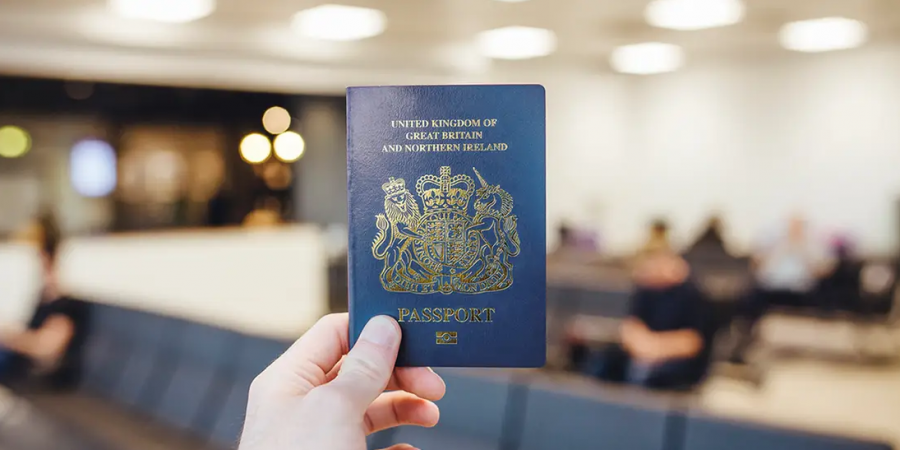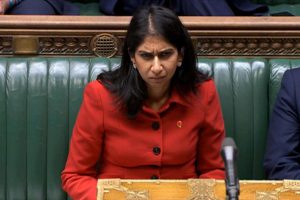by Matthew Paul
What do points make? Passports! Or at least the opportunity to get yourself a visa stamp allowing you –if you didn’t win the lottery of life by being born British– the unmissable opportunity to reside and work in the United Kingdom post-Brexit.
Some suggest that the only skills required at the end of the transition period will be an aptitude at barbecuing rats, or the strength to push around Covid-19 death carts while ringing a bell, but in the event that the UK’s economic and cultural life carries on after Brexit more or less as before, we will still face a chasmic shortage of workers in the agricultural, hospitality and care sectors.
Britain’s population is getting older, and the disinclination many Britons demonstrate towards looking after elderly relatives means that unglamorous, low-paid jobs in the care sector are always available to anyone who cares to do them. British consumers demand fresh, locally-produced food, but display little enthusiasm to pick it themselves, and react with bewildered indignation when people who are less picky about their work come over ‘ere and pick it for them.
The Government are probably right that a lot of people who voted to leave the EU in 2016 did so, at least in part, because they dislike mass immigration. Such people are also thicker on the ground in the ‘red wall’ seats that Boris turned blue –for the first time in living memory– in December. The Government has promises to keep with these voters, and stopping people they don’t like coming into the country is a good deal cheaper, at least in the short term, than building thumping great infrastructure projects or finding 50,000 new nurses. Probably from abroad.
On Wednesday, Home Secretary Priti Patel released details of a points-based system, modelled on Australia’s highly restrictive immigration rules, to clamp down on all the EU citizens who have been coming over ‘ere etc etc. Three characteristics are basic requirements to qualify for a residence and work permit: an offer of work from an approved sponsor [20 points], a job at “appropriate skill level” [20 points], and the ability to speak English (ble mae’r Gymraeg?) at a “required level” [10 points].
Once those requirements are satisfied, an applicant clears the final hurdle by earning 20 more points. A salary above £25,600 might get you that, so long as the government-approved going rate for the job isn’t higher. Working in a designated shortage occupation is also worth 20. Educational attainment is less highly regarded; a bachelor’s or master’s level degree counts for nothing. Arty-farty doctorates get you just ten points; only proper PhDs in difficult stuff like AI and rocket science get you over the line.
The Government’s statisticians reckon that around 70% of the EEA citizens who have come to Britain since 2004 would be ineligible for a visa under the new rules. Foreigners aside, not many British people in Britain would now be eligible to come to Britain. Priti Patel’s own parents –who came to the UK from Uganda and set up a successful chain of newsagents– certainly wouldn’t. Hypocrisy and Priti Patel are not exactly strangers; when she wasn’t busy this week trying to illegitimise her own residency in the UK, she was on Sky News telling a confused Kay Burley, who had heard somewhere that both the Prime Minister and the Chancellor of the Duchy of Lancaster might, at some point, have dabbled a bit in drugs, that there is no such thing as dabbling in drugs.
To prevent against labour shortages, the Government means to draw on the current pool of around 3.5 million EU citizens resident in the UK (of whom 3.2 million have applied for settled status). To top up seasonal labour markets, there will be a limited scheme of 10,000 short-term permits for agricultural work. Given that 60,000 people were engaged in seasonal work on farms in 2018, less than 1% of whom were British, this looks some way short of enough. And this assumes full uptake, which can’t be guaranteed. Seasonal labour schemes don’t afford workers anything like the certainty and ability to plan their futures –working up from seasonal labour into more permanent and fulfilling work– that free movement allowed.
The Government’s projections of the effectiveness of its points-based system also fail to take into account the chilling effect of an overall hostile environment for immigrants. EEA migration into the UK has crashed since the electorate’s decision in 2016 to repudiate EU membership. A large proportion of the workers who arrived in the mid 2000s from accession countries have already returned home.
This doesn’t mean that we are actually going to run short of nurses in our hospitals, or that bums will go unwiped lower down the food chain of the care sector. We will continue to fill jobs in the NHS and nursing homes by plundering the medically qualified workforces of Asia and sub-Saharan Africa, which does neither us nor them much good. Exploiting the schools and universities of countries which can ill-afford to train doctors and nurses is a cynical and immoral way to staff the NHS. It also creates more permanent migration; unlike EU citizens who hop on Ryanair when they get fed up with the rain, it is far less likely that immigrants from the third world will ever decide to move back to their country of origin.
The ability to come and go, and to move around the continent in search of work has underpinned the UK’s dynamic jobs market for nearly twenty years. To give Brexiters what they want in seriously and permanently reducing unskilled migration into the UK, we will have to give them what they almost certainly don’t want. Low paid work in the agricultural and hospitality sectors. Whipping away benefits or tax credits if they turn down that sort of job. In the immortal words of the man who this week tweeted his outrage from a long passport queue at Amsterdam’s Schiphol Airport: “This isn’t the Brexit I voted for.”


















Add Comment